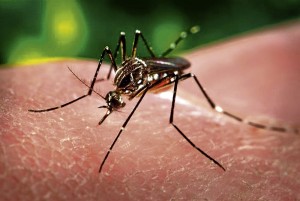First dengue vaccine goes under final test in PH

JUST a few more years and we would now have a vaccine that would finally deal with a mosquito-borne infection that hospitalized thousands of Filipinos.
Dengue fever, a debilitating mosquito-borne disease that infected close to 124,000 Filipinos in 2010 alone, may soon become a thing of the past.
This is because if all goes well in the final test being done here in the Philippines, the world will finally have its first effective vaccine against dengue no later than 2014.
There is currently no treatment, cure or vaccine for dengue.
The dengue fever vaccine, developed by France’s Sanofi Pasteur, is the first to undergo the advanced “Phase III” clinical trial, the final hurdle before it becomes available to the public.
The clinical trial aims to establish the efficacy of the vaccine. While the test is scheduled to last four years, the trial may be cut short especially if no dangerous side effects are detected or if the authorities and regulatory bodies including the World Health Organization and the United States Food and Drug Administration decide to fast track approval.
Article continues after this advertisement“Researchers worldwide have been working on a dengue vaccine for almost 60 years and for the first time, we have a potential candidate that actually shows great promise. The vaccine is important considering that while the dengue fever death toll is relatively small (of the current 27,000 hospitalized, 172 died already), most victims involve infants and young children,” says Dr. Maria Rosario Capeding, head of the Dengue Study Group that supervises the dengue vaccine clinical trial being done in San Pablo, Laguna and very soon in the province of Cebu.
Article continues after this advertisementCapeding explains that numerous obstacles have hindered scientists from finally coming up with an effective dengue fever vaccine. First, it could not be tested on animals—the virus only infects humans.
Second, since the dengue virus has four strains, the vaccine that must be developed should induce immune responses against all four types of dengue virus.
Proving effective
“Based on the initial results observed from the 2,000 children in Laguna (ages 2 to 14) since last month, the vaccine is proving to be effective as well as safe. The result validates the report coming from Thailand where 4,000 children are being evaluated since 2009,” Capeding reports.
San Pablo and Cebu was chosen because these two areas have an established monitoring and evaluation system that is required in the monitoring of the vaccine.
The Philippines and Thailand share a common history when it comes to dengue because it was in these two countries where the dengue hemorrhagic fever, a lethal complication of dengue fever, was first reported and identified in the 1950s.
Fifty-eight years later, dengue fever has become a major international public health concern considering that majority of those affected are children ages between one and 10 years old.
Hospitalized
Though dengue fever is usually not a fatal disease, young patients are more likely to be hospitalized especially if they develop high fever, severe headache, strain in muscles and rashes.
If left unmanaged, dengue fever could kill up to 20 percent of those infected as the patient develops life-threatening conditions like bleeding, low levels of blood platelets and blood plasma leakage (dengue hemorrhagic fever) and circulatory failure (dengue shock syndrome).
According to Dr. Lyndon Lee Suy, program manager of the Department of Health’s Emerging and Reemerging Diseases, there is no cure for dengue fever and the only option currently available is to manage the symptoms like keeping the patient well rested and hydrated, prescribing paracetamol to alleviate fever, acetaminophen to deal with the headache and muscle pain (aspirin and ibuprofen are not recommended since they may aggravate internal bleeding).
Until a vaccine becomes available, authorities are limited to doing public awareness campaigns to control mosquito populations.
However, limiting the mosquito’s breeding grounds like stagnant pools of water in old tires and tin cans, clean roof gutters, flower vases or even the use of fogging, mosquito nets or protective clothing are not proving very effective.
Continue to rise
Despite a nationwide campaign, the number of dengue cases in the Philippines continues to rise and is about to breach the 30,000 mark.
Capeding, who also heads the Research Institute for Tropical Medicine’s Department of Microbiology, explains that dengue fever is a threat to nearly half of the world’s population adding that of the estimated 220 million people infected each year, 2 million—mostly children—develop dengue hemorrhagic fever, potentially deadly complication.
Aside from the cost of hospitalization that families of victims will have to shoulder, stock of blood in blood banks also becomes alarmingly low during an outbreak.
“The public should be reminded that dengue is already an all-year-round disease and is more common during rainy days when there are more mosquito breeding sites,” says Dr. Ruby Mendoza-Dizon, medical director of Sanofi Pasteur Philippines, who adds that it has been the goal of the company to accelerate the adoption and introduction of dengue vaccine and to make it accessible to those living in high-risk areas.
Dengue fever is the most common mosquito-borne illness and is endemic in 100 countries, including the Philippines.
Rapid urbanization, characterized by densely populated areas and widespread mosquito breeding grounds, are often the reasons cited for its uncontrolled spread.